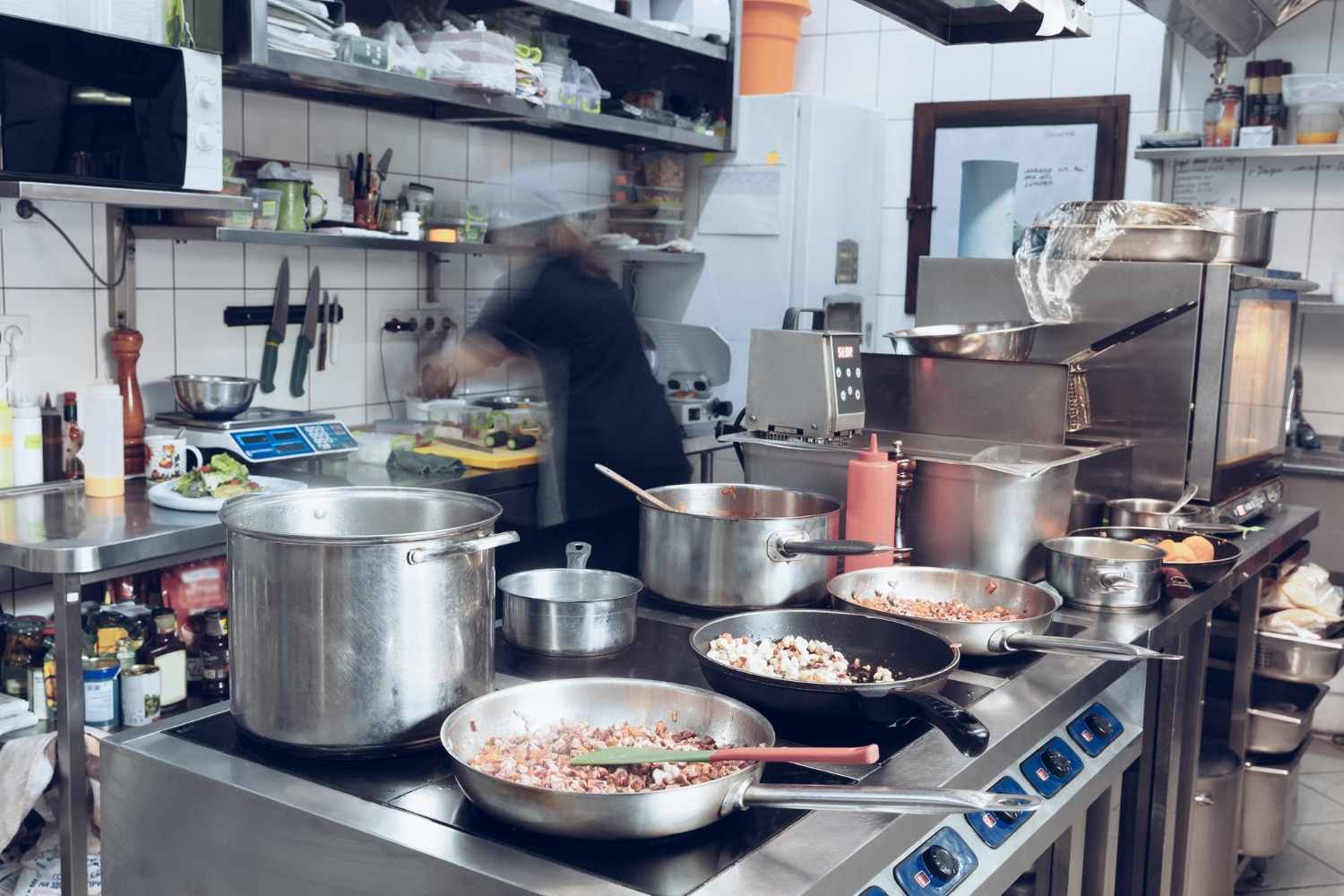
The demand for energy-efficient Singapore Commercial Cooking Equipment Market has witnessed a significant rise over the past few years. With growing concerns about environmental sustainability, rising energy costs, and the need for cost-effective solutions, businesses in the food service industry are seeking innovative technologies to improve their kitchen operations. This shift towards energy-efficient appliances not only helps reduce operational costs but also aligns with the global trend towards sustainability.
In this article, we explore the various trends in energy-efficient commercial cooking equipment in Singapore, focusing on the advantages of induction cookers, energy-saving ovens, and smart kitchen appliances. We will also discuss how these technologies contribute to reducing kitchen energy costs and promoting environmentally friendly practices in commercial kitchens.
Energy-Efficient Commercial Cooking Equipment: A Growing Trend
The food service industry in Singapore is undergoing a transformation as businesses increasingly prioritize energy efficiency in their kitchen operations. As energy prices continue to rise, commercial kitchens are adopting more sustainable and cost-effective solutions to meet their operational needs. Energy-efficient commercial cooking equipment, including induction cookers, energy-saving ovens, and other smart appliances, are becoming increasingly popular for their ability to reduce electricity consumption and lower energy bills.
One of the key drivers of this trend is the need for businesses to comply with stringent regulations and sustainability goals. Singapore's government has been actively encouraging businesses to adopt green technologies and reduce their carbon footprint. As a result, many commercial kitchens are turning to energy-efficient cooking equipment to not only meet regulatory standards but also improve their overall operational efficiency.
Induction Cookers: The Future of Energy-Efficient Cooking
Induction cooking technology is one of the most energy-efficient methods of cooking available in the market today. Unlike traditional cooking methods that rely on gas or electric stoves, induction cookers use electromagnetic energy to directly heat cookware, resulting in faster cooking times and less heat loss. This technology offers significant energy savings by providing faster, more precise cooking control, making it ideal for busy commercial kitchens where efficiency is paramount.
In addition to being energy-efficient, induction cookers also provide a safer and more controlled cooking environment. Since the cooking surface remains cool, the risk of burns or accidents is minimized. Furthermore, induction cookers are easy to clean, which contributes to improved hygiene standards in commercial kitchens.
Energy-Saving Ovens: A Key to Reducing Kitchen Energy Costs
Energy-efficient ovens are another essential component of sustainable kitchen appliances in Singapore. Traditional ovens consume a considerable amount of energy, especially in high-demand commercial kitchens. However, modern energy-saving ovens are designed to minimize energy consumption while maintaining cooking performance. These ovens use advanced technologies such as convection fans, better insulation, and heat recovery systems to ensure that heat is evenly distributed, reducing cooking times and energy wastage.
By adopting energy-efficient ovens, businesses can significantly reduce their kitchen's overall energy consumption, which in turn lowers operational costs. Moreover, energy-saving ovens are often equipped with programmable features that allow kitchen staff to set precise cooking temperatures and times, ensuring that food is cooked efficiently without the need for constant monitoring.
Smart Kitchen Equipment: The Integration of Technology for Energy Efficiency
The rise of smart kitchen equipment in Singapore is transforming the way commercial kitchens operate. Smart appliances, such as connected ovens, refrigerators, and cooking devices, can be controlled remotely and optimized for energy efficiency. These appliances are equipped with sensors and real-time data analytics, which allow kitchen operators to monitor energy usage and adjust settings to maximize efficiency.
For instance, smart ovens can be programmed to cook at specific temperatures and times, and they can automatically adjust cooking parameters based on the food being prepared. This helps reduce energy wastage and ensures consistent cooking results. Similarly, smart refrigerators and freezers can be programmed to maintain optimal temperatures, reducing the need for excessive cooling and minimizing energy consumption.
The integration of smart kitchen equipment in commercial kitchens also enhances operational efficiency by providing valuable insights into energy usage patterns. With real-time monitoring, kitchen managers can identify areas where energy consumption can be further optimized, leading to additional cost savings.
Sustainability and Cost Savings: Why Energy-Efficient Equipment Matters
The transition to energy-efficient commercial cooking equipment in Singapore is not only about reducing energy consumption but also about promoting sustainability. With the increasing global focus on environmental conservation, businesses are expected to adopt practices that minimize their carbon footprint. Energy-efficient appliances play a crucial role in this regard by reducing greenhouse gas emissions associated with energy generation and consumption.
Moreover, the long-term cost savings associated with energy-efficient equipment are significant. While the initial investment in energy-efficient appliances may be higher than traditional models, the reduction in energy bills over time makes them a worthwhile investment. For commercial kitchens that operate around the clock, the savings on energy costs can add up to substantial amounts, resulting in a quicker return on investment.
The Role of Singapore Sustainable Kitchen Appliances in the Foodservice Industry
In Singapore, the adoption of sustainable kitchen appliances is not only driven by environmental concerns but also by economic factors. The food service industry in Singapore is highly competitive, and businesses are constantly looking for ways to reduce costs and improve their profit margins. By investing in energy-efficient commercial cooking equipment, businesses can reduce their overhead expenses and allocate more resources to other areas of their operations, such as quality improvement, staff training, and customer service.
Sustainable kitchen appliances, such as energy-efficient induction cookers, ovens, and refrigerators, offer a dual benefit of reducing operational costs while contributing to a greener, more sustainable future. As consumers become more eco-conscious, businesses that prioritize sustainability in their operations are likely to attract environmentally aware customers, enhancing their reputation and customer loyalty.
Government Incentives and Support for Energy-Efficient Appliances
The Singapore government has introduced various initiatives to encourage businesses to adopt energy-efficient technologies, including those used in commercial kitchens. The Energy Efficiency Fund (E2F) and the Green Mark certification for buildings are just a few examples of programs that support businesses in their efforts to reduce energy consumption.
Through these programs, businesses can access financial incentives and rebates that offset the cost of purchasing energy-efficient appliances and upgrading their kitchen infrastructure. Additionally, the government’s emphasis on sustainability aligns with the global push towards reducing carbon emissions and combating climate change, providing further motivation for businesses to invest in energy-efficient cooking equipment.
Conclusion: The Future of Energy-Efficient Commercial Cooking Equipment in Singapore
The energy-efficient commercial cooking equipment market in Singapore is expected to continue growing as businesses recognize the economic and environmental benefits of adopting sustainable kitchen appliances. Technologies such as induction cookers, energy-saving ovens, and smart kitchen equipment are not only helping businesses reduce kitchen energy costs but also contributing to the larger global movement towards sustainability.
As energy prices rise and environmental concerns become more pressing, the adoption of energy-efficient appliances will become increasingly important for commercial kitchens in Singapore. By embracing these innovations, businesses can achieve long-term cost savings, improve operational efficiency, and enhance their environmental credentials, making energy-efficient commercial cooking equipment a smart investment for the future.
The future of Singapore’s food service industry is undoubtedly green, and businesses that embrace energy-efficient technologies will be well-positioned to succeed in a rapidly evolving market.











Write a comment ...